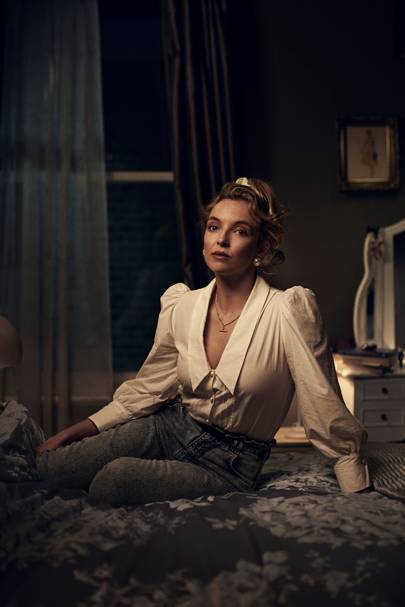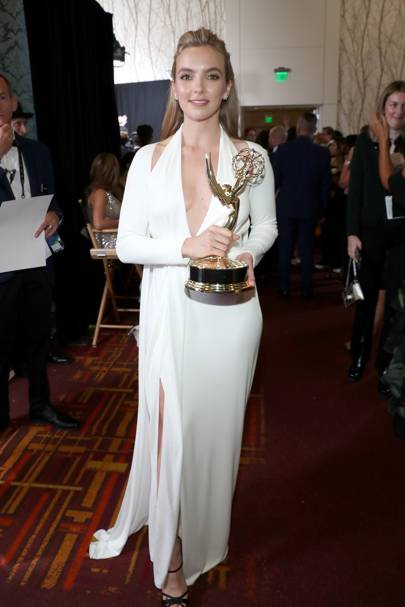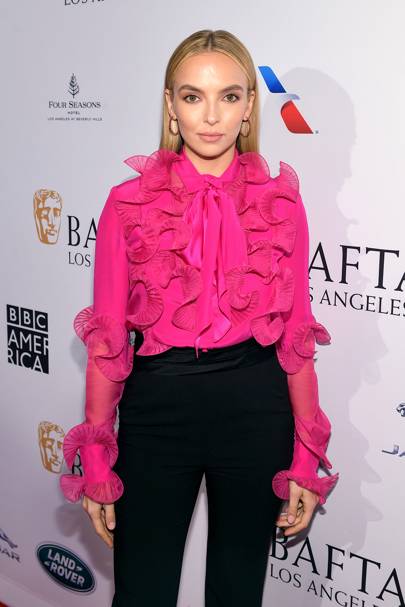Jodie Comer is the most talented actress of her generation and she has the receipts – or rather the accolades – to prove it. An Emmy award and a BAFTA award (she’s been nominated three times) are perhaps her most notable pieces of hardware, but her greatest achievement of all is that in a world where artifice rules, Jodie is a real queen of authenticity. That’s right, Jodie is even better in real life.
WATCH: Jodie Comer reveals the classism she has experienced in auditions due to her Liverpool accent and dealing with imposter syndrome
As Jodie prepares to star in Talking Heads – a new BBC reimagining of Alan Bennett’s monologues – where she plays an ambitious 1980s actress by the name of Lesley, she joins Josh Smith for the latest episode of GLAMOUR UNFILTERED, our bi-weekly chat show. Here Jodie talks about dealing with classist feedback in auditions because of her strong Liverpool accent, audition fails, building her self-esteem and putting her, “big girl pants on,” and why she never wants to be anyone’s milky cup of tea. Well Jodie, you are exactly our cup of tea…
Your episode of Talking Heads is a 45 minutes tour de force in acting from you…
It was so hard! I remember finishing the day and being like, “That is without a doubt the most difficult thing I’ve ever done,” so it’s something I definitely feel proud of.
So, murdering multiple people on screen and learning hundreds of accents for Killing Eve isn’t challenging enough for you, babe?
You know what it was? It was the concentration. I think there was 20 pages of dialogue. Obviously, we shot it within the lockdown with new rules and regulations, less people on set and there was one other person on set with me at any given time. The set was deadly, deadly silent and usually sets are so chaotic. Everyone’s just running around, trying to do what they need to do last minute before the camera turns over. This time it was like tumbleweed. Then obviously you’re looking down the barrel of the lens, which you’re also told, “Pretend the cameras not there.” To get a bit loosey-goosey, it just took a little bit of time.

BBC Pictures
This is meant to be Lesley’s big break in Talking Heads. Throughout your career has there been a time when you felt like something was going to be your big break, and you were like, “This is it, honeys,” and then it didn’t happen?
God, do you know what? I don’t think I have. I think for me what I always realised was with each role that I did, I always learned something new. I feel like they all mount up together. I feel like they all make up to that big, big break. Obviously, Killing Eve was huge. I think I’m more of the pessimist. I’m always a bit like, “No one’s going to like it! Oh God!” You worry more, I think, than going, “Well, this is it, guys. I’ve made it!” It’s more like, “Oh my God. Everyone’s going to hate it. Then I’m never going to work again,” which always, of course, is silly.
Of course, you do things, and you put so much into them. Not everything lands well, it’s not like everything you do is a roaring success and that’s okay. But I think as long as you go into something with integrity and you know the reasons you’re doing it and why you believe in it, it doesn’t matter if it’s a bit of a flop because you have stuck by your convictions. Whereas I think if you get into something for the wrong reasons, and then it doesn’t go well, then you’ve got to answer to yourself. I think actually that’s the hardest part, if you don’t kind of stay true to you and what you believe in.
What is your relationship with your self-critic like?
Oh my God! Well, up and down. It’s funny, and I think with myself critic with work, I’m better with dealing with that kind of critique of myself because I feel confident in what I do, I believe in what I do and I trust my strengths. Whereas if it’s something more personable, like your self-esteem or what people think of you or reading things online that aren’t true or those kinds of things, it’s harder for me to kind of put my big girl pants on and be like, “No, that isn’t right,” or, “That doesn’t make sense.” It just depends. It also depends on the time of the month, Josh, to be quite honest with you!
Lesley talks a lot about the audition process. For you, can you remember a time when you’ve done an audition, and you’ve thought, “This is the absolute pits. This is the worst of the worst moments for me,” …
Oh God. I remember when I was with my old agency, I got a train to London to do an audition for a theatre production that had dance in it. My train got delayed and I was probably 45 minutes late to this audition. When I got there, it was a dance workshop and there were already 30 girls in the room learning the choreography, very kind of Fame chorus line-esque! I just walked in with my bag, sweat dripping off me, and they were like, “Just go to the back and kind of follow the routine.”
Then of course, they’d bring you to the front in groups of four to then show. It was just terrible. The worst thing is I must’ve been about 15, 16 at the time. It was just horrifying. For me, as well, I know sometimes you can go into auditions and maybe you haven’t worked for seven months, and you’re like, “I need this job. I need this role.” Then when you go in, that comes across whether you think people don’t know but I know as well when I’ve sat in rooms when other people are being auditioned, the energy that you bring into an audition room is the first thing people pick up on. It sets the tone for the whole meeting.
But I love auditioning, and I haven’t for a while. Of course, it’s wonderful to be in a position where if people have material, they’re like, “Would you like to do this?” or, “We’re thinking of you.” That’s always where you aim to be, but I think there is something about going into an audition room, knowing all of your business, and then having the confidence of going, “I understand this character. This is how I feel. This is what I’ve made,” and then that kind of back and forth with director or the casting director. There is something that you get from that, that I really enjoy.
Also though if you get offered something the first time you’re going to actually do a scene is probably on day one if you don’t have rehearsals. Then you’re like, “What if they’re like, ‘Oh my God. We’ve cast the wrong girl,'” but of course, it’s all insecurity! It’s that little voice in your head that is constantly thinking that something’s going to be kind of swept from under your feet.

Getty Images
Do you still feel like it’s all going to be taken away?
I don’t think that goes away, and I kind of hope it doesn’t. I would never want to get to a point where I feel settled, because actually I think one of my driving forces is being scared to do something, because I think then you know that you’re challenging yourself, and then you’re only going to grow from that. Whereas I’ve done things before where I’ve felt like, “I feel like I’m safe in this, and I’m not feeling it here. I’m not feeling that kind of drive!”
That shows that there’s so much power in this idea of leaning into your insecurity – have you learned that?
Yeah! For me, that is acting. You put so much of yourself out there, all of your vulnerabilities. I know how I work, I draw a lot from our own experiences, and so much that you explore, and you portray through your characters is you. Actually, I think that can be quite cathartic. Some days, you might have a big kind of emotional day on set, some days you might go home absolutely exhausted, but then it’s kind of like a weird release.
We are all are vulnerable in our own little ways. I think that when you feel in a comfortable enough space to open up and someone else does, that connection is so lovely. I feel like it only draws you closer to people. I guess there’s this social media, “everything’s great, no problems here,” and with that we lose that ability to kind of connect with each other.
Can you remember a time you set out to prove someone wrong?
I did a theatre play when I was 16 years old, but I hadn’t got the part yet and I was going for the audition. The character was middle-class, RP, very well-spoken and from a very wealthy family. I got there, it was obvious I must’ve been the only Scouser and definitely girl from the Northwest of England. It wasn’t until I got the part that the director had told me that before I went in, she was like, “Why have we brought her in for the audition?” because she had seen where I was from, and she didn’t think I was capable. When she told me, I was like, “Wow.” That’s another thing I think is really interesting, because you just never know what’s happening on the other side of that door. I was like, “Wow, okay. That’s really interesting, that because I was from Liverpool, she didn’t think I could do an RP accent.”
That’s so classist as well, isn’t it?
Completely! In so many meetings they are like, “Can you lose that?” “Yes, I can. That’s why I’m here!” But maybe it’s just because it’s so strong. But I think it definitely is a classist thing. I think it’s something that is ingrained in you without you even knowing, like Stephen Graham, I always talk about this imposter syndrome because of where you’re from, you feel so lucky to be where you’re at. It’s like, “Well, actually, no. You have as much right to be there as anybody else with any other kind of background.” But I think it is a subconscious thing.
Do you feel you’ve tried to safeguard your identity and yourself so that you don’t get overwhelmed by this crazy situation that you’ve been placed in?
Yeah and also my family and my friends would put me in my place off the bat. But I think I’ve made peace with the fact this is the career I chose. This is the job that I love to do. But there is so little about this kind of career, this life that you don’t have control of. The bits that you have control of feel so sacred that you really want to protect them because there’s so much out of your control that this little part that you really want to kind of take care of.

Getty Images
Do you feel that you feel very protective of the young Jodie from Liverpool and do you take her with you, always?
Yeah! In lockdown the other day, we found baby videos from when we were four years old. It was so weird. It made me so emotional. It made me think, “Oh God, I wish we could all remember that came from these little people that are so innocent.” My family is such a huge part of my life. I’m also aware of, obviously, all of the kind of craziness that comes with it all that they get pulled into, their anonymity and I definitely feel protective of it. Home will always be home for sure.
We all have pitfalls of self-belief. Is there a time when you haven’t had self-belief, and you’ve picked yourself up and you’ve said, “Jodie, get this together”?
A lot of people think you work all the time. For me, now is a little bit different, but you might go to 30 auditions – 40 auditions before you get a yes. Actually, you’re constantly having to pick yourself back up. You go to an audition on the Monday, you don’t hear anything. You go to a different audition on the Thursday. The following Monday, “You didn’t get that,” and, “You didn’t get this one.” Relearning not to take it personally, and then go into your next meeting and not carrying that with you is hard. Actually, I think within acting, you’re dealing with it more frequently than not.
How have you dealt with rejection?
I think the key is to not take it personally. There are so many factors as to why you don’t get something and you have got to make peace with that. I think whenever I’ve not got a role and watched the thing that I auditioned for, I’m like, “I see why I didn’t get it.” You know? But then it’s so easy to go, “Oh God, was it the way I looked? Was it my acting? Was it too much?” I think the key is to try and not take it personally. You’re not always going to be someone’s cup of tea either and that’s all right.
Sometimes they like a milky tea, sometimes they like it with one sugar…
That’s what I mean! I don’t want to be someone’s milky tea. Thank you! I’m a Yorkshire (Tea). I don’t want to be someone’s milky tea. Make peace with it. Move on.
How much pressure and what kinds of pressure did you put on yourself at the beginning that you don’t necessarily put on yourself now?
Oh God. I think the notion of wanting everyone to think I’m great or good at what I do or the expectation to say the right thing, I think, is what I’m getting much, much better at, because obviously when you come into it, you’re an open book and you’re so eager to please. Then the more you go on, you’re like, “That’s not the way to the world works.” I’m definitely by no means there, and I don’t think you ever will be, but I’m definitely more better at going, “Okay, it’s someone’s opinion,” and that’s not going to affect my choices or what I do next or that kind of thing, so I guess just trying to keep a strong head about you.
Is there more respect in that sense for your voice, now?
Yeah, I think so. The truth is a lot of people need to see it to believe it. People need to see you doing something before they go, “She can actually do that!” You always have to prove people wrong! Having to prove people wrong is kind of enjoyable.
One of my favourite things you said to me when we spoke last year was about your hungover shifts at Tesco’s when you were younger. If you were a customer shimmying up to ‘checkout Jodie’ and you could give her one piece of advice, what would it be?
One, I’d probably say smile a little bit more when you’re on the till. I got a secret shopper once, and that was the note, was, “She could smile a little bit more.” I was like, “Okay, that’s probably fair.” What advice would I give her? I think honestly, it’s just to keep going. I’ve always had such a strong idea of what I want to do and what I don’t want to do. Don’t get me wrong, sometimes it’s so easy to kind of get swamped up in it all and get a little bit off track.
You know what? When I was young and doing jobs here and there, I’d have people say to me, “Well, you think you’re going to be in films? What are you going to do if that doesn’t work out?” and I’m like, “I can’t even about it. That’s not going to happen.” You know? When I think back to that response, I’m like, “Good for you.” Or I’d be like, “Maybe don’t go out three nights on the week. Get a little bit more sleep,” would probably be the advice, actually!
A couple of years ago, I was cleaning out my room, and I found my fist ever head shots and a certificate from a drama festival I did when I was 13, which I won. It’s so interesting when you look back and I guess if that person knew what was coming, then you probably wouldn’t end up being where you are. If someone was like, “You are going to grow up, and you’re going to find a lot of happiness in your job, and you’re going to be super successful,” then you’d probably get complacent, and then destiny would find another route for you.
What has been your biggest pinch-yourself moment?
I feel like when I got Killing Eve, and I had wanted to work with Phoebe (Waller-Bridge) so bad. I remember when I got the script for Killing Eve and I messaged my agent and said, “I really want this.” She was like, “Me too. I know you want it, but that doesn’t mean anything!” I was like, “I really want this. I don’t want anybody else to get this role. This cannot happen.” Of course, that enabled me to explore so many things and has kind of allowed me to then meet with these incredible writers and directors and kind of grow in that way, and I think it all came from that, so I’m so incredibly grateful for that. I think Phoebs is just a superstar. I have told her that she has to give me a part in everything else that she does. But if that never happens, to have had that opportunity is pretty major.
Do you think the power of that sisterhood that you had on that show means that you have more faith in your inner voice when you go into these more masculine-dominated spheres now?
Absolutely! I spend a lot of time with Dame Harriet Walter, who’s also in The Last Duel. Being around her and Fiona (Shaw), these women who are just kind of titans at what they do, they’re incredibly talented, they’re wickedly funny, and they don’t take themselves seriously at all. To be around that is so, so inspiring, and you can’t help but just want to be a sponge and be in their company and kind of play with them on set. It’s so much fun. I think that’s the biggest quality that I love about them, is that they never take themselves seriously. I feel like the moment you do that, it’s game over. But of course, then you have this access to go to people, and especially with Sandra (Oh). She kind of had her arms around me right from the beginning.
You can go to these people, and you can ask them their opinions, or, “I’m going through this. What was it like when you went through this? Do you have any advice?” Because I remember we were in Cannes, and Phoebs and Sandra, we were having a drink after the premiere. They were both like, “Just so you know, when this goes out, this could be quite a big thing. There’s probably things that you’re going to have to be a little bit more wary of or things you’re going to a little bit.” I always remember that because I was like, “Nah, shut up.” But it’s the moments like that, that I hope that when I’m working with younger actresses, that’s what I do, that people feel comfortable coming to me for that.
Talking Heads is available on BBC iPlayer now and Jodie’s monologue will appear on BBC One on Monday
